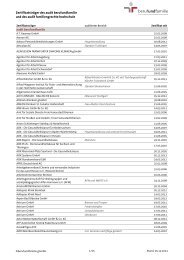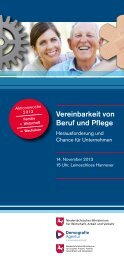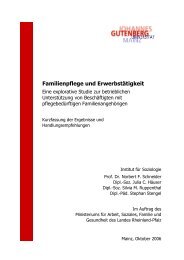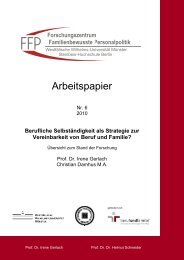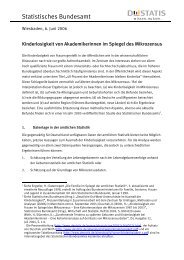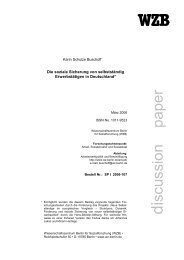Perspektive Wiedereinstieg - Beruf & Familie gGmbH
Perspektive Wiedereinstieg - Beruf & Familie gGmbH
Perspektive Wiedereinstieg - Beruf & Familie gGmbH
Sie wollen auch ein ePaper? Erhöhen Sie die Reichweite Ihrer Titel.
YUMPU macht aus Druck-PDFs automatisch weboptimierte ePaper, die Google liebt.
Women plan for and develop strategies for reentering only after their children have grown up<br />
to some extent and have become rather independent. Financial motives are playing a relevant<br />
role mostly for women bringing up a child without a partner. However, the most important<br />
reasons for a reentry are a lack of social recognition of family work, the feeling of not being<br />
challenged and wishes for social contacts, higher financial independency and individual fulfillment.<br />
The process of labor market re-entry is complex and there are many obstacles. Personally interviewed<br />
women are very satisfied with the support and attendance they received by the project<br />
providers during this process. Continuing education is partly used to make alignments as<br />
women of this mostly older generation did not always have the opportunity to learn the necessary<br />
skills for the occupation they actually desired. Qualification periods are used as a “probationary<br />
period” in order to adapt themselves and their families to a new daily rhythm. After a<br />
long employment break, women who want to reenter into the labor market have a high<br />
demand for updating their professional knowledge and competences, which could not always<br />
be satisfied. But there are also further barriers that even highly educated interviewed women<br />
face: in some regions or job segments it is difficult to get a job offer again. Because of family<br />
duties, women are often not mobile and not flexible in regard of their working hours. During a<br />
long withdrawal from the labor market, women’s professional selfconfidence often decreases.<br />
Intensive counseling and exchanges with other mothers help the women to develop selfconfidence<br />
and to apply for adequate jobs.<br />
Partners do not always offer some relief regarding family tasks. Family support services as a<br />
further opportunity of relief are only at marginal relevance. For women providing health care<br />
for family members, it is even more difficult to reenter into the labor market than for women<br />
providing child care. Amongst others, the reasons for this are time restrictions as well as a<br />
higher load of mental and physical stress.<br />
Half of the 30 personally interviewed persons had not taken up an employment again at the<br />
time of the interview. Reasons for this are ongoing qualifications, illnesses but also conscious<br />
decisions for (exclusive) family work instead of an early reentry on the part of some of the<br />
women participating in the model program.<br />
If the women have taken up an employment by the time of the interview they positively comment<br />
on their reentry; they enjoy working and earning money themselves and it strengthens<br />
their selfconfidence. They scarcely reported problems of reconciling family and work. Reasons<br />
for this are that children have already grown up to some extent and that most women<br />
have chosen parttime job offers which are easier to reconcile with their family tasks. Hence<br />
only a limited number of aftercares were provided by project providers in the qualitative sample.<br />
Working hours far from fulltime employment partly are considered only as a first step<br />
into the labor market and as a transition period; in the medium term some women wish to<br />
raise working hours or to switch from marginal to parttime employment. However, some<br />
interviewees do not consider shifting to a fulltime job in the longer term since family is their<br />
top priority, or they want to utilize their time for voluntary work or for themselves. In order to<br />
be able to work parttime some women take up jobs which are formally below their qualification<br />
level; a number of women hopes to switch into an adequate occupation later.





